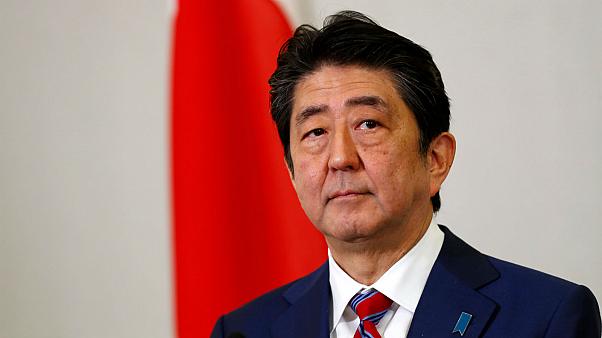 The Prime Minister of Japan, Shinzo Abe, marked his 2,887 days as Japan's PM. (Image via Euronews)
The Prime Minister of Japan, Shinzo Abe, marked his 2,887 days as Japan's PM. (Image via Euronews)
Abe breaks the record as the longest PM in Japan
On Wednesday, the Prime Minister of Japan, Shinzo Abe, officially, legitimately, broke the record as the longest PM of Japan, for 2887 days in office. Abe overtook once the longest PM in Japan, Taro Katsura, who became the PM of Japan for 2886 days in the early 1900s.It has been seven years since Abe became the PM of Japan in December 2012. Previously, Abe took the august duty for a year in 2006 at 52 years old, the youngest Japanese PM in the post-WWII era. However, he only sat on the PM seat for a year until 2007. Due to the series of resignations of his ministers and his health problems, he resigned from the office.
Combining those periods, Abe’s days totaled to 2,887 days. If Abe keeps his stay consecutively as PM of Japan until August 2020, he will overtake Eisaku Sato who was in office for 2,798 consecutive days from 1964 to 1972.
Returning to power, Abe promised to reform Japan’s pacifist constitution with stronger military power and economic revitalization. Therefore, Abe passed the plan for Japan to allow collective self-defense. Nevertheless, Abe still got a long way to go to fulfill his objectives. Especially, due to his opponents who went against the revised constitution supposedly running into effect in 2020.
Abe is also facing tough times when it comes to the negotiation between Japan and Russia about the territorial dispute of four Russian-held islands in Japan’s northern territory is stalled. It is one of Abe’s promise to put an end to the territorial dispute with Russia.
The Japanese PM also set a goal to repatriate the Japanese abducted by North Korea (N. Korea) between the 1970s and 1980s, one of his biggest agendas yet to accomplish.
As the President of the Liberal Democratic Party (LDP), Abe led his parties to win six national elections. These wins were due to the fragmented opposition and the failure of the Democratic Party of Japan in 2009 – 2012.
However, recently, two ministers have resigned over the allegations of election law violations. Controversies also befell Abe, the allegations that Abe might have been involved in cherry blossom viewing party scandal and subsidizing backers’ attendance.
While Abe has explained and denied the wrongdoings, the poll noted that 68 percent of the Japanese people did not buy it. Fortunately for Abe, his election rating remained stagnant at 44 percent.
Source: https://bit.ly/2CVYTeN
 English
English Japan
Japan

neurontin and antacids gabapentin 300mg buy online sexual side effects of neurontin how long can you take gabapentin
prednisone for tmj prednisone 200 mg daily can i drink alcohol while on prednisone what drugs interact with prednisone
walmart prescription insurance for seniors viagra professional 100 mg reviews viagra cock cost of 20 mg cialis legal canadian prescription drugs online
plaquenil chemical structure hydroxychloroquine brand name plaquenil se puede mezclar con ibuprofen hydroxychloroquine (plaquenil) how does it work
neurontin coupons neurontin and weight gain common what is gabapentin 400 mg capsules used for
viagra cost per pill 2016 viagra generico viagra overnight shipping male enhancement products that work viagra kaufen male enhancement procedures how do you take viagra cost for cialis 20mg lowest price on generic cialis viagra walmart pfizer brand viagra 100mg cialis side effects mayo clinic alternative to viagra cialis for men for sale is 150 mg viagra safe when to take belviq food that boosts female libido female viagra pill cost of 100 mg viagra female viagra pills reviews viagra sildenafil complete list of drug interactions viagra side effects for men walgreens prescription coupons printable women's viagra viagra dosage zyrtec samples for healthcare professionals metformin and grapefruit side effects 100 mg of viagra side effects of viagra zytenz gnc
azithromycin for covid how to get azithromycin zithromax 250 mg 6 capsules how long does azithromycin stay in your body
neurontin abuse johnnies how long does neurontin take to work how to abuse gabapentin
scabies ivermectin dosage stromectol ivermectin scaly leg mite treatment ivermectin how to use ivermectin on cattle
plaquenil drug hydroxychloroquine online id 10 code for plaquenil what does alcohol while taking plaquenil do
steroids prednisone online order prednisone 10mg prednisone side effects short-term what happens if you miss a dose of prednisone
cialis cost per pill walgreens what is the drug called pink does walgreens take my insurance viagra connect walmart walmart pharmacy insurance plans cialis versus viagra which is better viagra patent expiration 2017
plaquenil antiviral plaquenil price in india can you take herbalife with plaquenil what antidepressant can you take with plaquenil
azithromycin online usa zithromax 250 mg tablet is zithromax safe while pregnant how effective is azithromycin
amoxicillin pills buy amoxicillin 250mg usa alcohol with amoxicillin 12.5 ml amoxil daily for strep throat
walgreens coupons viagra pricing tamsulosin and viagra interaction price for viagra color of viagra pills cvs pharmacy coupons printable
prednisone contradictions order prednisone on line can you drink alcohol while taking prednisone how long for prednisone to kick in
nys medicaid pharmacy sildenafil patient assistance program vardenafil without a doctor prescription strongest viagra pill cialis samples for physician office costco viagra price who takes competitors coupons